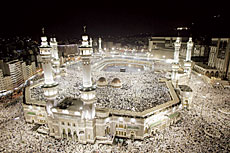Omar ibn Said
Omar Ibn Said (also "Sayyid," ca. 1770-1864), who was born in Western Africa in the Muslim state of Futa Toro (on the south bank of the Senegal River in present-day Senegal). He was a Muslim scholar and trader who, for reasons historians have not uncovered, found himself captive and enslaved. After a six-week voyage, Omar arrived in Charleston, South Carolina, in about 1807. About four years later, he was sold to James Owen of North Carolina's Cape Fear region. In 1819 a white Protestant North Carolinian wrote to Francis Scott Key, the composer of The Star Spangled Banner, to request an Arabic translation of the Bible for Omar, and apparently Key sent one. Historians dispute how much the African Muslim leaned toward Christianity in his final years, but Omar's notations on the Arabic bible, which offer praise to Allah, suggest that he retained much of his Muslim identity, as did some other first-generation slaves whose names have been lost to us. (Omar's Arabic bible, which has recently been restored, is housed in the library of Davidson College in North Carolina.) (Ref: http://nationalhumanitiescenter.org/tserve/twenty/tkeyinfo/islam.htm)
For almost 200 years, those familiar with Omar ibn Said have debated how complete or genuine his supposed conversion to Christianity was. Said began his autobiography with the 67th surah of the Qur’an,Al-Mulk (“dominion” or “ownership”). Starting, as do all surahs but one, with Bismillah (“In the Name of God…”), its text continues, “Blessed be He in Whose hands is Dominion; and He over all things hath power….” Said’s meaning is clear: It is God who holds sway over creation. (Ref: http://archive.aramcoworld.com/issue/201002/the.life.of.omar.ibn.said.htm)
Fayetteville tax accountant Adam Beyah also serves as an imam at Fayetteville’s Omar ibn Sayyid mosque. He is one of few people to have sought out the site and the few remains of the Owen plantation. (Ref: http://archive.aramcoworld.com/issue/201002/the.life.of.omar.ibn.said.htm)
